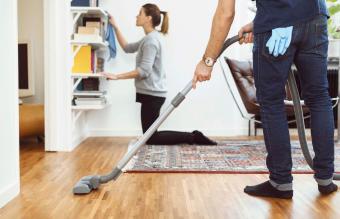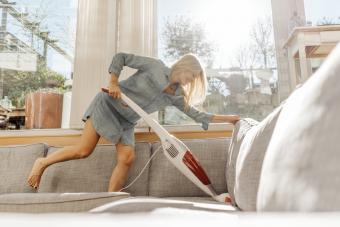
There is an overabundance of cleaning supplies available to purchase which can lead to over-spending on unnecessary items. Finding the best cleaning supplies and tools can help you keep your house as clean and germ-free as possible, especially during a bout of illness, epidemic, or pandemic.
Cleaning Products and Tools for the Whole House
Look for tools, products, and small appliances that will help keep the entire home clean.
Vacuum Cleaner With HEPA Filter
Vacuuming regularly can help keep your house clean by partially removing allergens, dust particles, dust mites, and some germs. Using a vacuum with a HEPA filter allows you to remove smaller particles that can impact the air's quality. Be sure when purchasing a vacuum that you find one with a true HEPA filter as these can capture smaller particles in the air and on your home's surfaces. Change the HEPA filter according to your vacuum's specific instructions to ensure that it is as effective as possible. If you have carpets, be sure to vacuum them at least twice a week as they can easily trap dust, germs, and allergens in their fibers.
Multi-Surface Cleaning Spray
Finding a solid cleaning spray that can tackle multiple surfaces in your home is a great product to have. Be sure to note a few of the major surfaces in your home before finding a product that works best for you. Some products can be used to clean your floors, countertops, as well as heavily touched surfaces in your home. If you have children or pets in your home, look for products that are child and pet safe, meaning that they are suitable to be used in areas where your children and/or pets frequent. You can opt for a multi-surface cleaning spray, as well as a multi-surface disinfectant to use. Note that true disinfecting sprays will have a label on the bottle which denotes their disinfecting efficacy.

If you're on the hunt for eco-friendly products, search for cleaners that come with refillable bottles as purchasing refills instead of another bottle of cleaner can save you money over time. If possible, try to avoid products with added fragrances, VOCs, triclosan, phalates, parabens, and formaldehyde as these are linked to serious health concerns when exposed to regularly.
Steam Mop
Many steam mops will reach a temperature of around 250 degrees Farenheit, which means they have the ability to kill and remove some germs present on your floors. Some germs and viruses tend to have difficulty surviving past boiling point, which is 212 degrees Farenheit, making a steam mop a great cleaning tool to have if you have hard flooring in your home. Be sure when purchasing a steam mop that you know what temperature it reaches, and choose one that at least gets to 212 degrees Farenheit.
Carpet Cleaner
If your carpet is not machine washable, it's important to have an effective spot cleaning spray to use in case of an accident, as well as a carpet steam cleaner for a deeper clean. Look for sprays that disinfect if you have little ones or pets that tend to have germy accidents such as vomiting and/or pooping. Baking soda can be used for non-germ related carpet accidents by shaking some on the carpet to absorb the spill and vacuuming up once the accident is absorbed.
Carpet cleaners will range from temperatures of 100 to 300 degrees Fahrenheit. Because some carpets cannot tolerate high temperatures of heat, it's important to research what type of carpet you have and note which type of cleaner will work best for you. If your carpet cannot tolerate heat high enough to kill germs, there are antibacterial solutions available to use as well. Always consult with the company prior to purchasing if you are unsure about your needs to ensure you don't ruin your rug.
Re-Usable Cleaning Tools
Re-usable cleaning tools can be sanitized or disinfected, are more environmentally friendly than single use tools, and can save you money long-term.
Washable Cloths
Unlike paper towels which can leave germs on their surface which may sit in your trash for up to a week, washable cloths wipe away or disinfect germs (depending on the solution used) and can be sanitized in your washing machine and dryer immediately after use. If you opt to use washable cloths, designate some for the kitchen, bathroom, and general use and be sure to wash them on the hottest cycle as soon as possible. With washable cloths, you don't run the risk of running out of them, which can be especially helpful during paper towel shortages.
Washable Mop
Whether you use a steam or regular mop, choosing one with a washable mop head prevents you from running out of backups if stores don't have your specific brand's single use refill available. Washable mop heads should be cleaned on the hottest washing machine cycle if possible and allowed to dry fully before storing. If possible, purchase at least two washable mop heads so you always have a clean back-up available.
Best Bathroom, Kitchen, and Laundry Cleaning Supplies
The bathroom, kitchen, and laundry room can be hotbeds for some germs and viruses to thrive. Clean your bathroom and laundry room on a weekly basis and several times a week if you or another individual in your home is sick. Clean the kitchen after each cooking session to ensure its cleanliness. Disinfect as needed.
Bathroom Disinfectant
Because the bathroom can be a moist environment, some germs and bacteria may be able to thrive. When cleaning your shower, toilet, and sink area, be sure to do a thorough job and look for visible dirt, mold, and anything bacteria-like with a slimy appearance. Bathroom disinfecting spray can be used in the shower, toilet, and sink area once a week, or more frequently when someone is under the weather. Non-disinfecting spray can be used to keep the bathroom clean a few times a week or as needed. Be sure to follow instructions when using disinfectant, as ventilation during cleaning is often recommended.
Shower Cloth
A cloth and toilet wand are both helpful tools to keep in your cleaning supply closet. The cloth can be used to scrub in the shower disinfecting spray or just wipe down and clean the shower with your non-disinfecting bathroom cleaner. Use a cloth specifically for your shower and be sure to launder it in on the hottest setting after every use.
Kitchen Disinfectant Spray
The kitchen can be one of the dirties places in your home, and considering your food prep is done there, it's critical to keep it super clean. A bleach solution can be used on some countertops and sinks, depending on the surface material, as a disinfectant spray. If you have children or pets and want something more gentle, look for child- or pet-safe disinfecting sprays. Be sure to disinfect cabinet handles, countertops, your sink, faucet, and all of your kitchen appliances. Your cutting board should be cleaned after every use to keep this frequently used item sanitary. Use a washable cloth to clean the kitchen and launder it after every cleaning session on the hottest cycle.
Toilet Wand
A toilet wand can help you clean the grime that builds up under the toilet seat lid and can assist with scrubbing out hard water stains in the bowl. Toilets should be cleaned with a brush about once a week or as needed. Some toilet wands offer replaceable heads to swap out every few months, while others are meant to be fully replaced after they've worn down. Some toilet wands come with stands, while others do not. If you opt for one with a stand, choose one that has good ventilation, as moisture build-up supports bacterial growth. Wands should be sprayed with disinfectant, rinsed, and allowed to air dry completely before storing again after each use.

Washer and Dryer Maintenance Supplies
Your washer and dryer are great sanitizing and clean tools that should be taken care of and kept clean. Laundry can have loads of bacteria lingering on it which can transfer to your machines. Disinfect the exterior of the machines if someone has recently been ill and wipe with a multi-purpose spray when dust begins to build up as needed. To keep the washing machine clean, run the hottest cycle without clothing. You can add white vinegar to the cycle if there is an odor present, but keep in mind that the hot water is what kills the germs. Dryers can be wiped with disinfectant if someone was recently ill and allowed to air dry before using again. They can also be wiped with a non-disinfecting spray such as a white vinegar solution just to maintain their cleanliness on a monthly basis.
Should I Purchase Cleaning or Disinfecting Supplies?
When cleaning your home, it's important to understand the distinction between cleaning and disinfecting. While you can't make your environment sterile, you can still disinfect your home to the best of your ability if someone is under the weather, or during an epidemic or pandemic. Cleaning refers to wiping germs away, while disinfecting means killing them, but not necessarily wiping them away.
Clean Regularly and Disinfect During Times of Illness
Keep in mind, with children and/or pets in a home, it's especially important to consider which products will best suit your needs while maintaining your family's safety. Some disinfectants are linked to health issues due to the harsh chemical composition and can irritate those who have pre-existing health issues. Unless someone is under the weather or you have been exposed to a potential health risk, there is no need to disinfect your entire home on a frequent basis. You can clean the majority of your home, which will wipe germs away, and disinfect frequently touched surfaces, as well as kitchens and restrooms. You can also disinfect a space if someone in your home has been under the weather.
Best Cleaning Supplies
Finding the best cleaning supplies can help you streamline your products and tools so you can focus on keeping your house as clean and germ free as possible. Be sure to follow product precautions when using cleaning solutions and keep them in an out of reach place if you have children or pets in your home. If possible, open windows and/or run bathroom fans to ensure ventilation while cleaning and avoid doing so when pets or children are nearby. Always wash your hands thoroughly after cleaning a given area in your home and encourage members of your household to frequently wash their hands to ensure that your home's surfaces stay as clean as possible.







